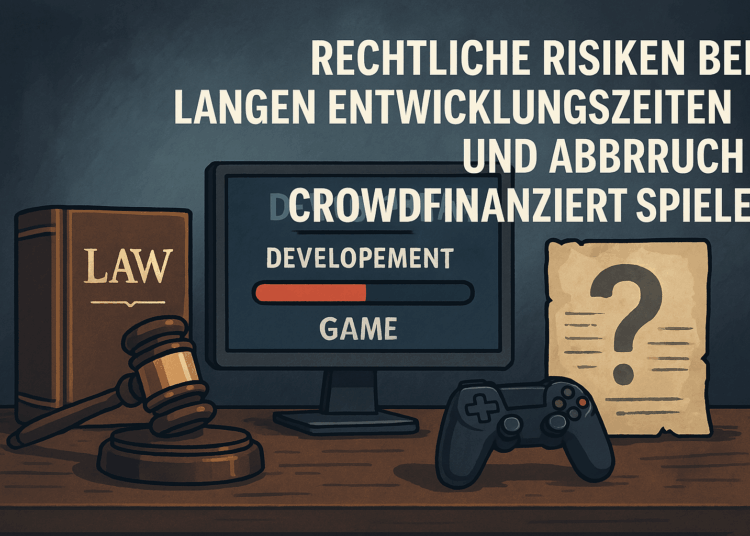Crowdfunding has established itself as a financing model in the games industry. Developers collect money from supporters to pre-finance the development of a game – be it via platforms such as Kickstarter or Indiegogo, or via pre-order options on their own website. However, if there are significant delays in development or the project is even abandoned, the developers face considerable legal risks. The following section takes a comprehensive look at the legal consequences and what obligations developers have towards backers in such situations.
Supporters’ claims for reimbursement
A key risk if the game is not completed or takes too long to develop is that backers are entitled to a refund of their money. If a promised game is not delivered within a reasonable period of time or ultimately fails, backers can demand their money back. Legally, this claim depends on the type of contract on which the crowdfunding is based and which agreements have been made:
- On crowdfunding platforms (e.g. Kickstarter, Indiegogo): The terms of use of such platforms stipulate that the contract for financing is concluded directly between the developer (project initiator) and the backer. If the promised product (the game or other rewards) is not delivered, the contract is not fulfilled. Supporters then generally have the right to withdraw from the contract and demand their money back. In practical terms, this means that the developer must refund the contributions received. Kickstarter itself, for example, states in its guidelines that project initiators must either deliver the promised rewards or repay the support funds if fulfillment fails. The same applies to Indiegogo – even if the money is paid out even if the funding target is not reached in the case of flexible financing models, this does not release the project initiator from the obligation to either deliver or refund.
- In the case of pre-order models via dedicated websites: Here, supporters often conclude a purchase contract or a contract for the future delivery of a game directly with the developer studio. If the studio does not fulfill its delivery obligation, buyers are entitled to rescission under general contract law. In particular, consumer protection law (e.g. in the EU) stipulates that in the event of non-delivery within an agreed or reasonable period, the consumer can withdraw from the contract after setting a deadline and demand a refund of the amount paid. If development is delayed excessively, supporters can therefore set a final grace period. If this also expires without success, there is a statutory right of withdrawal (§ 323 BGB in Germany) – the developer must then refund the amount paid.
It is important to note that these reimbursement claims exist regardless of whether the delay is due to unforeseen difficulties or miscalculations. From the supporters’ point of view, money was given in expectation of something in return. If this does not materialize, there can be no “money for nothing”. This can have financial consequences for developers, especially if the funds already invested are no longer available – in extreme cases, there is a risk of insolvency if numerous backers demand their money back at the same time.
Allegations of fraud and improper use of funds
Accusations of fraud are another significant risk, particularly if there is a suspicion that the funds collected have been used improperly or that there was no serious development intention from the outset. From a legal point of view, this could constitute a criminal offense of fraud (§ 263 StGB in Germany or corresponding provisions in other countries).
- Misrepresentation of facts: If it turns out that a developer already knew at the time of the campaign that the project was not feasible or deliberately made false promises in order to obtain funds, this can be regarded as fraudulent inducement. In such a case, supporters would have given their money under false pretenses. Under criminal law, this can lead to investigations – developers would then have to expect that criminal investigation proceedings for fraud would be initiated in addition to civil law reclaims. In practice, there have already been cases internationally in which action has been taken against initiators of failed crowdfunding projects due to precisely such allegations.
- Misappropriation of funds: Even if the initial intention was serious, the use of the funds can become a problem. Crowdfunding contributions are earmarked for the development of the specific project. If the money is instead diverted to private purchases or other projects, supporters feel deceived. Although the contributions are not legally fiduciary funds (the developer acquires ownership of them upon disbursement), improper use can, in retrospect, be seen as an indication of intent to enrich oneself. In some countries, consumer protection authorities and public prosecutors have already taken action: In the USA, for example, the Federal Trade Commission (FTC) took action in 2015 against a Kickstarter project launcher that did not use funds received for the advertised project. Local prosecutors (e.g. the Attorney General in the state of Washington) have also filed lawsuits in cases of obvious misappropriation, resulting in criminal sanctions and the obligation to repay the funds to supporters.
- Failure in good faith vs. fraudulent failure: In legal terms, a distinction is made as to why a project fails. Failure in good faith – for example due to technical problems, misjudgements or external circumstances – triggers civil law consequences (breach of contract, reversal), but generally no criminal law consequences as long as the developer acts transparently and there was no intent to deceive. The situation is different in the case of fraudulent failure: If, for example, false information was already provided during the campaign, progress was faked or risks were concealed in order to gain supporters, this can be considered fraud in retrospect. Developers must therefore take great care to provide truthful information and use funds for specific projects to avoid being accused of fraud.
Contractual obligations of the developer
Irrespective of the criminal law level, the developer has main contractual obligations towards the supporters. When the financing comes about, a contract is created that results in mutual obligations: The backer provides money, the developer owes a defined service in return (usually the finished game, often including additional rewards such as T-shirts, access to the beta, etc.).
- Delivery of the promised service: The most important contractual obligation of the developer is to deliver the announced game (or the rewards) in the promised form. This obligation to fulfill the contract is central. If the game is not completed at all, this constitutes non-performance. If it is only completed with a considerable delay, this may also be considered a breach of duty, depending on the agreement, especially if a specific delivery date or at least an approximate period of time was promised. Many campaigns state an estimated delivery date (“Estimated Delivery: October 2023” etc.). Legally, such a date can be binding or non-binding, depending on how it is communicated. If it was declared as a mere estimate, the developer could argue that no fixed deadline was agreed. Nevertheless, the delay must not be unreasonable – what is unreasonable depends on the circumstances (for a complex game, a delay of a few months may be acceptable, but several years is hardly).
- Secondary obligations and diligence: In addition to the primary obligation, there are also secondary obligations arising from the contract. This includes, for example, doing everything reasonable to make the project a success. The developer owes not just any product at any time, but the product described in the campaign promise. Serious deviations in terms of content or a clearly inferior quality end product could also be considered a breach of contractual obligations, as the service received does not correspond to the promised service (keyword: warranty for material defects or defects of title, transferred to digital goods). In addition, the developer has a duty not to violate the interests of the backers – e.g. not to misuse the backers’ internal information, not to make arbitrary changes to the business model that deprive the backers of their rights, etc.
- Type of contract – purchase or contract for work: From a legal point of view, the exact classification of the contract is interesting. Is a backer payment a purchase contract (advance purchase of a future game) or a contract for work and services (commission to produce a specific game)? This distinction is discussed in German law. A contract for work and services (Section 631 BGB) obliges the developer to produce a promised work, whereby the customer (backer) does not generally have to pay until acceptance – in crowdfunding, however, payment is made in advance, which is rather untypical for classic contracts for work and services. A purchase contract (Section 433 BGB) obliges the delivery of an item in return for payment; here, payment is made in advance with delivery in the future. In practice, the distinction is mainly relevant for legal details (such as warranty periods, acceptance, etc.), less so for the core issue of delivery or repayment. In both cases, the following applies: No delivery means no consideration – if the work is not delivered, the customer/buyer can demand his money back. For the developer, this means that the contractual obligation to fulfill the performance commitment exists regardless of the exact contractual qualification.
- Impossibility of performance: If the project finally fails, the legal consequences are Impossibility of performance (Section 275 BGB for Germany: the developer can no longer provide the service owed). The consequence of this is that the developer’s claim to consideration lapses (Section 326 BGB) – i.e. the developer may not keep the money received, as the promised service has not been provided. This once again underpins the supporters’ right to reimbursement and makes it clear that the developer cannot unilaterally avoid their obligation by canceling the project; they must then generally reimburse the contributions received (unless a different solution is agreed individually with the backers, e.g. conversion into voluntary donations).
Information and accountability obligations
During the development period – especially if it takes longer than announced – communication with supporters plays an important role. From a legal point of view, the question is to what extent the developer is obliged to provide information about progress, delays or problems and to account for the use of funds.
- Contractual or statutory information obligations: Unlike shareholders or investors, for example, crowdfunding backers are generally not subject to any explicitly standardized statutory accountability obligations on the part of the developer. However, information obligations may arise from the principle of good faith (Section 242 BGB). If it is foreseeable that a delivery date cannot be met or difficulties jeopardize completion, the developer must not leave backers in the dark, at least within the bounds of what is reasonable. The platform rules or the implicit expectation of the community often oblige project starters to provide regular updates. Kickstarter, for example, requires project initiators to keep their backers up to date and report problems openly. Completely disappearing without communication can not only destroy trust, but is also legally considered a breach of secondary obligations – especially if it deprives backers of the opportunity to exercise their rights (e.g. withdrawal).
- Accountability for the use of funds: Many backers rightly expect their money to actually flow into the project. Although the developer does not automatically owe every backer a detailed statement, transparency about the use of funds can be crucial in the event of failure. On the one hand, it puts backers’ minds at ease if they learn that the money has been used entirely for development costs, licenses and materials, for example – this can invalidate accusations of enrichment. On the other hand, in the event of a dispute (e.g. in court), the developer can be required to explain why repayment is not (fully) possible and where the money went. Platforms often require in their guidelines that it is explained what happened to the funds if a project is canceled. Legally, a backer could argue in the event of total failure that they have a right to information about the use of their funds – although this is not directly provided for by law, such a question would arise anyway in the context of claims for damages or fraud investigations. It is therefore advisable for developers to keep thorough records of the funds used in order to be accountable in the event of an emergency.
- Communication as prevention: Even if not every delay automatically results in legal action, an open information policy is the best way to prevent escalation. Many legal conflicts only arise when supporters feel deceived or let down. Regular project updates, honest admissions of setbacks and outlining a plan can prevent backers from rushing into legal action. Admittedly, good communication is no substitute for contractual rights – a backer retains their right to withdraw if performance fails, despite all the nice updates. But from a developer’s perspective, transparency and dialog can help reach mutually agreeable solutions (such as backers voluntarily extending the waiting period or partial refunds) instead of being immediately confronted by a lawyer or government agency.
Platform conditions and disclaimers
Crowdfunding platforms such as Kickstarter and Indiegogo try to provide a legal framework that excludes their own liability and regulates the obligations between developers and backers. Developers need to be fully aware of these platform terms and conditions, as they stipulate certain obligations on the one hand and do not offer complete immunity on the other.
- Liability of the platform vs. liability of the developer: In general, platforms largely exclude their own liability. Kickstarter, for example, expressly points out that no guarantee is given for the success of a project or the delivery of the promised rewards. The responsibility lies entirely with the project initiator. Backers should be aware that they are backing at their own risk. This means for the developer: In the event of a dispute, he cannot claim that the platform is responsible for anything – legally, backer claims are directed directly against him. At the same time, Kickstarter (as quoted in Wikipedia) warns all project starters that they are liable for any claims for damages from sponsors if they do not keep their promises. This warning makes it clear that while the platform is not liable, the developer is fully liable.
- Terms of use and obligations: The terms of use of the platforms usually contain specific requirements. With Kickstarter, developers commit to using the money for the intended purpose and to fulfill the rewards if the project is successful. If a developer is unable to complete the project, the Kickstarter guidelines require them to make every effort to find a solution – this includes, in particular, refunding any remaining funds or at least presenting a plan for partial fulfillment. Indiegogo has similar rules; in addition, for flexible funding campaigns (where money flows even if the goal is not reached), the expectation is that the campaign starter will deliver the promised service if possible or otherwise actively work with backers to find a solution (which often includes refunds). Violations of the platform T&Cs can lead to the developer being excluded from further campaigns and – in the event of fraudulent behavior – possibly being reported to the authorities.
- Liability clauses vis-à-vis supporters: Some developers try to formulate limitations of liability or exclusions of refunds in their project descriptions or their own terms and conditions (especially in the case of preorders on their own website). Caution is advised here: In consumer law (e.g. in Germany under Sections 307 et seq. of the German Civil Code), clauses that deprive consumers of essential rights – e.g. blanket “refunds excluded” or “delivery dates non-binding, no claims in the event of delay” – are often invalid if they put them at an unreasonable disadvantage. Although platform terms and conditions themselves are not directly subject to GTC control by the developer (as they are provided by the platform), a developer who creates their own terms and conditions (e.g. on their own store page) must observe the statutory limits. Blanket warranty exclusions or disclaimers are ineffective in many legal systems in the B2C sector. This means that even if a campaign states in small print that delays do not give a right of withdrawal, a court could see this differently and give greater weight to consumer protection. Developers should therefore not rely on the fact that they can absolve themselves of responsibility through their own clauses.
- Governing law and place of jurisdiction: Platforms often specify which law applies to the contractual relationship (e.g. in the case of Kickstarter, usually the law of the US state of New York) and which courts have jurisdiction. However, these clauses usually only apply between platform and developer or platform and user. The actual contractual relationship between the developer and the backer may not be affected, especially if the developer and the backer are based in the same country. Example: A German backer backs a project by a German developer on Kickstarter – despite the platform being based in the USA, the contract may be deemed to have been concluded in Germany and German law may apply. For the developer, this potentially means that he cannot rely on always being sued in the USA under American law in the event of disputes; a consumer could also take him to court in his home country if consumer protection rules permit this (keyword: EU consumer jurisdiction). It is therefore worth not only dutifully nodding off the platform terms and conditions, but also understanding their content and limitations.
German and European legal framework
Crowdfunding often takes place globally, but developers based in Germany or the EU and supporters from these regions are subject to special consumer protection regulations. The legal classification of supporter services and the question of which rights they are entitled to are particularly relevant under German and European law.
Classification of support: gift, purchase or contract for work?
In German law, the decisive factor is how the supporter’s performance is to be legally qualified, as many obligations and rights depend on this:
- Gift (donation): If it is a gratuitous contribution without consideration, one could speak of a gift (Section 516 BGB). Some crowdfunding supporters, for example, deliberately choose to make a contribution without any reward, simply to promote the project. Legally, such a supporter would not actually be entitled to anything in return – they have deliberately made a gift. However, pure donations are the exception on the major platforms; donors usually expect at least a symbolic consideration (mention in the credits, T-shirt or similar). However, as soon as any consideration is promised, it is no longer a donation, but a synallagmatic (mutual) contract.
- Purchase contract: Very often, the crowdfunding constellation corresponds to a purchase on advance payment. The supporter “buys” the future product (e.g. the game as a download or boxed edition) and pays immediately, although delivery will only take place in the future. This can be summarized under § 433 BGB (purchase contract): The developer as seller must deliver the purchased item at the agreed time, the buyer has already paid (or will pay if the campaign is successful). Other goodies (figures, artbooks, etc.) are also ultimately objects of purchase. Most courts would probably regard such a contract as a purchase, as a finished product is owed – even if it still has to be produced.
- Contract for work and services: In some cases, it could be argued that this is a contract for work and services (Section 631 BGB), as the developer specifically produces a “work” (the game) and the supporter, as the customer, to a certain extent places the order. The difference to a purchase is blurred: contracts for work and services are typical when something is individually produced for the customer (e.g. software according to customer requirements). In the case of crowdfunded games, however, the product is the same for a large number of users and not personalized for individual backers. There is therefore much to be said for assuming a contract of sale. Nevertheless, a contract for work and services has similar obligations: The manufacturer owes the creation of the promised work. If such a contract is assumed, the legal consequences in the event of failure would be the same – the claim to remuneration would lapse and any payments already made would have to be repaid.
- Hybrid forms and uncharted legal territory: crowdfunding is somewhere between a gift and a purchase – it is often referred to as hybrid in nature. Developers like to argue that backers are “supporters” and not buyers in order to emphasize the uncertainty of the outcome. Legally, however, it cannot be denied that promises of consideration constitute a contract for consideration. In Germany, there is still no supreme court decision that clearly typifies a crowdfunding contract, but the tendency in the literature is to treat it like a normal pre-sale contract. For developers, this means that they cannot claim in court that the money was only a voluntary donation – at least not if they have promised a specific delivery.
Consumer protection in distance selling: right of withdrawal and delayed delivery
Especially in the European and German context, consumer protection laws apply to crowdfunding transactions, as distance selling contracts are regularly concluded between an entrepreneur (the developer studio) and consumers (the backers).
- Right of withdrawal: In traditional online retail, consumers have a 14-day right of withdrawal (Section 312g BGB, EU Consumer Rights Directive 2011/83/EU). This means that a consumer can cancel the contract within 14 days of concluding the contract or receiving the goods without giving reasons and reclaim their money. If this is applied to crowdfunding, this results in an explosive scenario: if a developer based in the EU sells a game via pre-order or accepts pre-orders financed via Kickstarter, consumers could theoretically cancel their contribution within 14 days of completing payment. In practice, this is hardly provided for in the platform processes – Kickstarter, for example, does not actively inform backers about an EU right of withdrawal, and many backers are not even aware of this possibility. Legally, however, such a right of withdrawal may exist. The developer would therefore basically have to properly inform every EU supporter about the right of withdrawal. If he fails to do so, the right of withdrawal remains in force even beyond the 14 days (extended to 12 months in Germany). This represents a considerable risk: A backer could declare revocation weeks or months after the end of the campaign and demand repayment, which thwarts the financing plan. Developers should therefore at least be aware that this rule exists. Some circumvent it by arguing that the content is digital and that the right of withdrawal expires as soon as the fulfillment of the contract has begun – but for this to happen, the backer would have to explicitly agree to digital deliveries beginning immediately, for example, and waive the right of withdrawal. However, this exception does not apply to a game in the distant future, as there is no immediate delivery. In short: the right of withdrawal always applies in crowdfunding, and a developer who ignores this risks legal problems with consumer protection organizations or individual backers.
- Delayed delivery and reasonable deadline: Another aspect of consumer protection is timely delivery. The EU directive stipulates that if no fixed delivery date has been agreed, the trader must deliver within 30 days, otherwise the consumer can send a reminder and set a grace period. In the case of crowdfunding projects, it is clear from the outset that 30 days is not enough – there are often months or years between financing and planned completion. However, an estimated delivery date is usually given. If this is significantly exceeded, one can speak of a delay in delivery. Under German law, the debtor (in this case the developer) is in default at the latest when the creditor (backer) sends a reminder after the due date (Section 286 BGB). In practice, backers could therefore send a reminder after the announced delivery month, demand delivery within a certain period and withdraw from the contract if the deadline is exceeded. This procedure largely corresponds to the above-mentioned right of withdrawal due to non-performance – however, it is expressly emphasized in consumer protection that such cases of default entitle the consumer to withdraw from the contract. For the developer, this means that excessive development times automatically increase the risk of contract termination and repayment requests. Even if no “hard” delivery date was contractually agreed, this does not provide unlimited protection against claims: At some point, a waiting period is considered unreasonable. What is “unreasonable” depends on the circumstances, but you can be sure that doubling or tripling the originally forecast development period will raise critical questions.
- Warranty law for digital products: Recent EU regulations, such as the Digital Content Directive (EU 2019/770, implemented in Germany in Sections 327 et seq. of the German Civil Code), strengthen consumer protection for digital services. Accordingly, a digital product (such as a video game) must be provided at the agreed time and in the agreed condition. If the developer fails to do so, the consumer is entitled to warranty rights – ultimately including the right to withdraw from the contract if grace periods remain fruitless. Applied to crowdfunding, this means that legally recognized warranty rights could also apply if the delivered game deviates significantly from what was promised (qualitative defect), or if it is not delivered at all (legally speaking, non-performance, which is treated similarly). Although it may be argued that crowdfunding is a special case, the legal texts make no distinction between a pre-purchased game and a game normally purchased in a shop.
Special features of German law: GTC control and legal consequences of failure
In addition to general contract and consumer law, there are a few specific German legal issues that are relevant for crowd-funded games:
- GTC control of risk exclusions: As mentioned, clauses in general terms and conditions that unilaterally restrict liability or obligations are subject to judicial review. For example, a developer who writes in its terms of use, “The game will be delivered if possible. There is no entitlement to delivery; the backer accepts the risk of failure” would hardly be successful in German courts. Such a clause would practically undermine the contract – the backer would no longer have any rights – which is unreasonably disadvantageous. The consequence: the clause would be null and void and the developer could not invoke it. The same applies to clauses that generally exclude refunds or exclude legal recourse. Developers in Germany must therefore draft their contractual terms fairly and in compliance with the law. Transparency about risks is permitted and sensible, but it does not replace the minimum legal rights of consumers.
- Legal consequences if a project is canceled: It is also interesting to consider whether a crowdfunding contribution can perhaps be reinterpreted as a gift agreement if the project fails so that the money can be kept. It would be conceivable for developers to argue: “You supported us in the knowledge that there was a risk, so you effectively gave us the money as a gift.” However, such an interpretation would contradict the actual agreement if rewards were promised. German law does recognize the frustration of contract (Section 313 BGB) as an instrument for adjusting contracts if unforeseeable circumstances arise. A developer could try to say: “The development was much more complex than expected – the basis of the contract was that we would manage with budget X. This is no longer the case, so we can cancel the contract. This no longer applies, so we can’t fulfill the contract as it stands.” In practice, however, this would hardly lead to supporters not getting their money back; rather, one could talk about adjustments (e.g. extension of the deadline, additional funding). If the project is canceled, it remains the same: no money without performance. If the developer becomes insolvent, the backers are unfortunately regular insolvency creditors – they have to register their claims and, in the worst case, would only receive a quota (or nothing). This insolvency risk is effectively borne by the backer, which is an inherent disadvantage of crowdfunding. But as long as the developer is solvent, the law will force them to refund the funds received instead of keeping them without delivering.
- Distance selling information obligations: It should not be forgotten that developers in their own online store (for pre-orders) can also Statutory information obligations for example, the obligation to provide a legal notice, clear information about the product and instructions about the right of withdrawal. Failure to do so can result in warnings from consumer protection associations or competitors. The so-called “button solution” (Section 312j BGB) requires, for example, that the order button clearly indicates the obligation to pay (labeled with “order with obligation to pay”, for example). Crowdfunding platforms such as Kickstarter use buttons such as “Back this project”, which is borderline by German standards – however, Kickstarter operates directly outside the German legal area. However, a German developer with their own store must scrupulously adhere to such formal requirements, otherwise, in addition to the content-related problems of non-compliance, there is also the threat of Formal legal disadvantages.
International perspectives: USA, UK, Australia
The legal treatment of crowdfunding risks varies from jurisdiction to jurisdiction. Some countries have already gained experience with disputes relating to delayed or failed games:
USA
In the United States, there is no specific crowdfunding law for reward-based crowdfunding; general contract and fraud principles are applied. Most platforms (Kickstarter, Indiegogo) are US-based and apply US law in their terms and conditions. Important for developers:
- Contract law and lawsuits: Backers in the USA can file a civil lawsuit for breach of contract if a promised reward is not delivered. However, the expense of an individual lawsuit is often an obstacle for smaller amounts. In some cases, however, groups of supporters have banded together or brought class actions when a project involved a particularly large number of claimants and large sums of money. US courts have tended to confirm that a binding contract is formed once the campaign has been successfully funded and the supporter has been charged – with corresponding enforceable obligations.
- Regulatory intervention: As mentioned above, the FTC has intervened in at least one prominent case. This occurred in the case of a board game whose creator spent Kickstarter funds for private purposes. The FTC obtained a cease and desist order and refunds. Prosecutors at state level have also intervened in individual cases. The general consumer protection law of the USA, which protects against “unfair or deceptive acts or practices”, applies here. If a crowdfunding project appears to be a fraudulent deception, it can be prosecuted as an unfair practice.
- Mail Order Rule: It is interesting to note that there is an FTC regulation in the USA, the so-called Mail Order Rule (or “Mail, Internet, or Telephone Order Merchandise Rule”). This stipulates that ordered goods must be delivered within the promised time or – if no time is specified – within 30 days, or the seller must notify the customer and offer a refund if necessary. This rule could theoretically also apply to pre-order crowdfunding if it is considered a sale of goods. However, its application to crowdfunding is unclear, as it is a somewhat specific situation (usually with announced long delivery times). Nonetheless, developers, especially if they themselves accept pre-orders from US customers, should be aware of this rule. If there are long delays, a consumer could argue that the developer has violated this rule.
- Criminal law (fraud): The threshold for criminal prosecution (e.g. for wire fraud at federal level) is reached in the USA if it can be proven that the project initiator acted with fraudulent intent – e.g. never intended to deliver or made false promises in order to obtain money. The US authorities have taken selective action here, for example in cases where millions were involved or where there was obvious audacity. For a developer, this means that even in the USA you are not safe from prosecution if you abuse the trust of backers.
United Kingdom (UK)
In the UK, EU law applied until the end of 2020, and many of these consumer protection principles are still enshrined in national law (in some cases continued identically). Crowdfunding in the UK context has the following aspects:
- Contract and consumer law: Similar to the EU, a crowdfunding contribution aimed at a reward is likely to be considered a purchase contract or order. The Consumer Rights Act 2015 and the Consumer Contracts Regulations 2013 (implementation of the EU Directive) also offer consumers in the UK rights of withdrawal and rights in the event of non-delivery. A supporter in the UK could therefore also cancel within 14 days or withdraw from the contract in the event of severe delays. However, practical enforcement in crowdfunding cases is also rare in the UK – often due to ignorance on the part of consumers or because many projects have international constellations where it is unclear which law applies.
- Regulatory perspective: The British Advertising Standards Authority (ASA) has dealt with crowdfunding in the past, particularly with regard to advertising for such campaigns. Advertisements or project descriptions must not be misleading. If a developer glosses over risks or makes unsustainable promises, this could be considered a breach of advertising standards. While the ASA itself does not make refunds, a negative finding damages reputation and can increase regulatory pressure.
- Practical cases: A well-known crowdfunding flop in the UK was the “Zano” drone project, in which thousands of backers lost money. Although no collective legal action was taken at the time (2015), the incident led to discussions. The British authorities focused more on clarification: Kickstarter commissioned a journalist to investigate the case instead of involving the courts. This shows the gap that still exists between the legal situation and reality: in principle, the backers could have held Zano’s inventors liable for non-fulfilment – but the company went bankrupt and practical legal enforcement was hardly possible.
- Unfair terms: Similar to German courts, UK courts would take a critical view of very far-reaching exclusions of liability in the general terms and conditions (unfair contract terms). A developer serving UK customers should therefore not attempt to completely shift risk in its terms and conditions.
Australia
Australia has also made its presence felt when it comes to crowdfunding, in particular through an active consumer protection authority (ACCC) and strict consumer laws:
- Australian Consumer Law (ACL): The ACL protects consumers from misleading and deceptive commercial practices. A developer targeting consumers in Australia (e.g. Australian backers in a campaign) is subject to these rules. If the project fails, the ACCC may investigate whether false promises were made. There have been cases where the ACCC has investigated crowdfunding projects. For example, a company that crowdfunded a product but never delivered it was ordered by the ACCC to repay the contributions and not make misleading statements about progress.
- Enforcement: In Australia, authorities can demand so-called enforceable undertakings from companies – written assurances to take certain measures (such as making refunds) to make up for violations of the law. For developers, this means that if they have received funds from Australian consumers and they complain, they could be subject to regulatory requirements that go beyond what an individual backer could achieve. The Australian courts would also consider the contracts to be consumer contracts, similar to the UK/EU, with corresponding rights in the event of non-delivery.
- Criminal prosecution: Fraud cases could also be prosecuted in Australia. Although we are not aware of any known criminal proceedings in Australia relating to crowdfunding games, the legal situation (fraud, possibly unlawful procurement of financial benefits) would make it possible to prosecute particularly brazen cases.
Conclusion of the international perspectives
This can be seen worldwide: No jurisdiction leaves crowdfunding completely unregulated. Everywhere, either general laws apply or there are initial precedents that make it clear that developers cannot simply fall back on “tough luck, it was crowdfunding”. In some countries, consumer rights are particularly strong (EU, UK, Australia), in others the focus is more on subsequent enforcement by authorities (USA). Developers who raise funds internationally must therefore observe the strictest common denominator – in case of doubt, the requirements of EU consumer protection and the possibility of official intervention as in the USA.
Conclusion: Professional handling of risks required
Excessive development times or the failure of a crowdfunded game are not only a business disappointment, but also harbor considerable legal pitfalls. Developers have a duty not to leave their backers without rights. Refund claims, contractual fulfillment obligations and consumer protection rights set clear limits on how much delay and risk backers can be expected to accept. At the same time, developers have to live with the risk of being personally liable in the event of failure – in the worst case, even to the point of accusations of fraud.
In order to manage these risks, developers should take legal precautions in advance: for example, communicate realistic schedules, make risks transparent, plan financial cushions for possible repayments and draft their contractual documents in a legally compliant manner. During development, open communication and, if necessary, the offer of voluntary partial reimbursements or compromises is advisable if it is foreseeable that targets cannot be met. Ultimately, legal considerations show that crowdfunding is not a legal vacuum. What has been contractually promised must either be delivered or reimbursed. Developers, publishers and their legal advisors are therefore advised to approach crowdfunding projects with the same care and responsibility as traditional business models – because the support of the “crowd” creates legally binding expectations that must be met professionally.












































